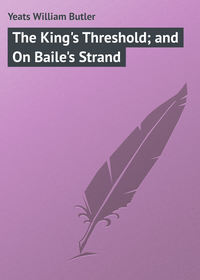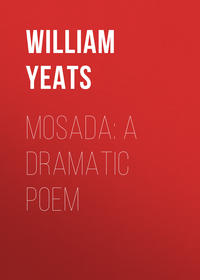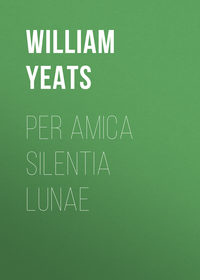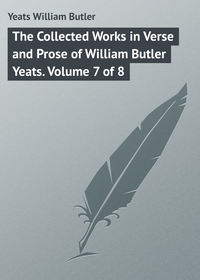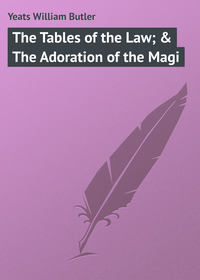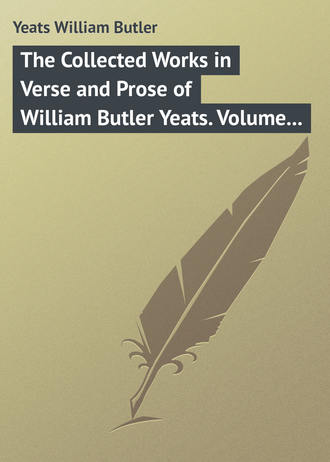 полная версия
полная версияThe Collected Works in Verse and Prose of William Butler Yeats. Volume 3 of 8. The Countess Cathleen. The Land of Heart's Desire. The Unicorn from the Stars
Lying there stiff and stark. He has a very quiet look as if there was no sin at all or no great trouble upon his mind.
FATHER JOHN [kneels and touches him]He is not dead.
BIDDY [pointing to NANNY]He is dead. If it was letting on he was, he would not have let that one rob him and search him the way she did.
FATHER JOHNIt has the appearance of death, but it is not death. He is in a trance.
PAUDEENIs it Heaven and Hell he is walking at this time to be bringing back newses of the sinners in pain?
BIDDYI was thinking myself it might away he was, riding on white horses with the riders of the forths.
JOHNNYHe will have great wonders to tell out the time he will rise up from the ground. It is a pity he not to waken at this time and to lead us on to overcome the troop of the English. Sure those that are in a trance get strength, that they can walk on water.
ANDREWIt was Father John wakened him yesterday the time he was lying in the same way. Wasn’t I telling you it was for that I called to him?
BIDDYWaken him now till they’ll see did I tell any lie in my foretelling. I knew well by the signs, he was coming within the best day of his life.
PAUDEENAnd not dead at all! We’ll be marching to attack Dublin itself within a week. The horn will blow for him, and all good men will gather to him. Hurry on, Father, and waken him.
FATHER JOHNI will not waken him. I will not bring him back from where he is.
JOHNNYAnd how long will it be before he will waken of himself?
FATHER JOHNMaybe to-day, maybe to-morrow, it is hard to be certain.
BIDDYIf it is away he is he might be away seven years. To be lying like a stump of a tree and using no food and the world not able to knock a word out of him, I know the signs of it well.
JOHNNYWe cannot be waiting and watching through seven years. If the business he has started is to be done we have to go on here and now. The time there is any delay, that is the time the Government will get information. Waken him now, Father, and you’ll get the blessing of the generations.
FATHER JOHNI will not bring him back. God will bring him back in his own good time. For all I know he may be seeing the hidden things of God.
JOHNNYHe might slip away in his dream. It is best to raise him up now.
ANDREWWaken him, Father John. I thought he was surely dead this time, and what way could I go face Thomas through all that is left of my lifetime, after me standing up to face him the way I did? And if I do take a little drop of an odd night, sure I’d be very lonesome if I did not take it. All the world knows it’s not for love of what I drink, but for love of the people that do be with me! Waken him, Father, or maybe I would waken him myself. [Shakes him.]
FATHER JOHNLift your hand from touching him. Leave him to himself and to the power of God.
JOHNNYIf you will not bring him back why wouldn’t we ourselves do it? Go on now, it is best for you to do it yourself.
FATHER JOHNI woke him yesterday. He was angry with me, he could not get to the heart of the command.
JOHNNYIf he did not, he got a command from myself that satisfied him, and a message.
FATHER JOHNHe did – he took it from you – and how do I know what devil’s message it may have been that brought him into that devil’s work, destruction and drunkenness and burnings! That was not a message from heaven! It was I awoke him, it was I kept him from hearing what was maybe a divine message, a voice of truth, and he heard you speak and he believed the message was brought by you. You have made use of your deceit and his mistaking – you have left him without house or means to support him, you are striving to destroy and to drag him to entire ruin. I will not help you, I would rather see him die in his trance and go into God’s hands than awake him and see him go into hell’s mouth with vagabonds and outcasts like you!
JOHNNY [turning to BIDDY]You should have knowledge, Biddy Lally, of the means to bring back a man that is away.
BIDDYThe power of the earth will do it through its herbs, and the power of the air will do it kindling fire into flame.
JOHNNYRise up and make no delay. Stretch out and gather a handful of an herb that will bring him back from whatever place he is in.
BIDDYWhere is the use of herbs, and his teeth clenched the way he could not use them?
JOHNNYTake fire so in the devil’s name, and put it to the soles of his feet.
[Takes a lighted sod from fire.FATHER JOHNLet him alone, I say! [Dashes away the sod.
JOHNNYI will not leave him alone! I will not give in to leave him swooning there and the country waiting for him to awake!
FATHER JOHNI tell you I awoke him! I sent him into thieves’ company! I will not have him wakened again and evil things it maybe waiting to take hold of him! Back from him, back, I say! Will you dare to lay a hand on me! You cannot do it! You cannot touch him against my will!
BIDDYMind yourself, do not be bringing us under the curse of the Church.
[JOHNNY steps back. MARTIN moves.FATHER JOHNIt is God has him in His care. It is He is awaking him. [MARTIN has risen to his elbow.] Do not touch him, do not speak to him, he may be hearing great secrets.
MARTINThat music, I must go nearer – sweet marvellous music – louder than the trampling of the unicorns; far louder, though the mountain is shaking with their feet – high joyous music.
FATHER JOHNHush, he is listening to the music of Heaven!
MARTINTake me to you, musicians, wherever you are! I will go nearer to you; I hear you better now, more and more joyful; that is strange, it is strange.
FATHER JOHNHe is getting some secret.
MARTINIt is the music of Paradise, that is certain, somebody said that. It is certainly the music of Paradise. Ah, now I hear, now I understand. It is made of the continual clashing of swords!
JOHNNYThat is the best music. We will clash them sure enough. We will clash our swords and our pikes on the bayonets of the red soldiers. It is well you rose up from the dead to lead us! Come on, now, come on!
MARTINWho are you? Ah, I remember – where are you asking me to come to?
PAUDEENTo come on, to be sure, to the attack on the barracks at Aughanish. To carry on the work you took in hand last night.
MARTINWhat work did I take in hand last night? Oh, yes, I remember – some big house – we burned it down – but I had not understood the vision when I did that. I had not heard the command right. That was not the work I was sent to do.
PAUDEENRise up now and bid us what to do. Your great name itself will clear the road before you. It is you yourself will have freed all Ireland before the stooks will be in stacks!
MARTINListen, I will explain – I have misled you. It is only now I have the whole vision plain. As I lay there I saw through everything, I know all. It was but a frenzy that going out to burn and to destroy. What have I to do with the foreign army? What I have to pierce is the wild heart of time. My business is not reformation but revelation.
JOHNNYIf you are going to turn back now from leading us, you are no better than any other traitor that ever gave up the work he took in hand. Let you come and face now the two hundred men you brought out daring the power of the law last night, and give them your reason for failing them.
MARTINI was mistaken when I set out to destroy Church and Law. The battle we have to fight is fought out in our own mind. There is a fiery moment, perhaps once in a lifetime, and in that moment we see the only thing that matters. It is in that moment the great battles are lost and won, for in that moment we are a part of the host of heaven.
PAUDEENHave you betrayed us to the naked hangman with your promises and with your drink? If you brought us out here to fail us and to ridicule us, it is the last day you will live!
JOHNNYThe curse of my heart on you! It would be right to send you to your own place on the flagstone of the traitors in hell. When once I have made an end of you I will be as well satisfied to be going to my death for it as if I was going home!
MARTINFather John, Father John, can you not hear? Can you not see? Are you blind? Are you deaf?
FATHER JOHNWhat is it? What is it?
MARTINThere on the mountain, a thousand white unicorns trampling; a thousand riders with their swords drawn – the swords clashing! Oh, the sound of the swords, the sound of the clashing of the swords!
[He goes slowly off stage. JOHNNY takes up a stone to throw at him.
FATHER JOHN [seizing his arm]Stop – do you not see he is beyond the world?
BIDDYKeep your hand off him, Johnny Bacach. If he is gone wild and cracked, that’s natural. Those that have been wakened from a trance on a sudden are apt to go bad and light in the head.
PAUDEENIf it is madness is on him, it is not he himself should pay the penalty.
BIDDYTo prey on the mind it does, and rises into the head. There are some would go over any height and would have great power in their madness. It is maybe to some secret cleft he is going, to get knowledge of the great cure for all things, or of the Plough that was hidden in the old times, the Golden Plough.
PAUDEENIt seemed as if he was talking through honey. He had the look of one that had seen great wonders. It is maybe among the old heroes of Ireland he went raising armies for our help.
FATHER JOHNGod take him in his care and keep him from lying spirits and from all delusions!
JOHNNYWe have got candles here, Father. We had them to put around his body. Maybe they would keep away the evil things of the air.
PAUDEENLight them so, and he will say out a Mass for him the same as in a lime-washed church.
[They light the candles.THOMAS comes inTHOMASWhere is he? I am come to warn him. The destruction he did in the night-time has been heard of. The soldiers are out after him and the constables – there are two of the constables not far off – there are others on every side – they heard he was here in the mountain – where is he?
FATHER JOHNHe has gone up the path.
THOMASHurry after him! Tell him to hide himself – this attack he had a hand in is a hanging crime. Tell him to hide himself, to come to me when all is quiet – bad as his doings are, he is my own brother’s son; I will get him on to a ship that will be going to France.
FATHER JOHNThat will be best, send him back to the Brothers and to the wise Bishops. They can unravel this tangle, I cannot. I cannot be sure of the truth.
THOMASHere are the constables, he will see them and get away. Say no word. The Lord be praised that he is out of sight.
Constables come inCONSTABLEThe man we are looking for, where is he? He was seen coming here along with you. You have to give him up into the power of the law.
JOHNNYWe will not give him up. Go back out of this or you will be sorry.
PAUDEENWe are not in dread of you or the like of you.
BIDDYThrow them down over the rocks!
NANNYGive them to the picking of the crows!
ALLDown with the law!
FATHER JOHNHush! He is coming back. [To Constables.] Stop, stop – leave him to himself. He is not trying to escape, he is coming towards you.
PAUDEENThere is a sort of a brightness about him. I misjudged him calling him a traitor. It is not to this world he belongs at all. He is over on the other side.
MARTIN[Standing beside the rock where the lighted candles are.]Et calix meus inebrians quam præclarus est!FATHER JOHNI must know what he has to say. It is not from himself he is speaking.
MARTINFather John, Heaven is not what we have believed it to be. It is not quiet, it is not singing and making music, and all strife at an end. I have seen it, I have been there. The lover still loves but with a greater passion, and the rider still rides but the horse goes like the wind and leaps the ridges, and the battle goes on always, always. That is the joy of Heaven, continual battle. I thought the battle was here, and that the joy was to be found here on earth, that all one had to do was to bring again the old wild earth of the stories – but no, it is not here; we shall not come to that joy, that battle, till we have put out the senses, everything that can be seen and handled, as I put out this candle. [He puts out candle.] We must put out the whole world as I put out this candle [puts out another candle]. We must put out the light of the stars and the light of the sun and the light of the moon [puts out the rest of the candles], till we have brought everything to nothing once again. I saw in a broken vision, but now all is clear to me. Where there is nothing, where there is nothing – there is God!
CONSTABLENow we will take him!
JOHNNYWe will never give him up to the law!
PAUDEENMake your escape! We will not let you be followed.
[They struggle with Constables; the women help them; all disappear struggling. There is a shot. MARTIN stumbles and falls. Beggars come back with a shout.
JOHNNYWe have done for them, they will not meddle with you again.
PAUDEENOh, he is down!
FATHER JOHNHe is shot through the breast. Oh, who has dared meddle with a soul that was in the tumults on the threshold of sanctity?
JOHNNYIt was that gun went off and I striking it from the constable’s hand.
MARTIN[Looking at his hand, on which there is blood.]Ah, that is blood! I fell among the rocks. It is a hard climb. It is a long climb to the vineyards of Eden. Help me up. I must go on. The Mountain of Abiegnos is very high – but the vineyards – the vineyards!
[He falls back dead. The men uncover their heads.PAUDEEN [to BIDDY]It was you misled him with your foretelling that he was coming within the best day of his life.
JOHNNYMadness on him or no madness, I will not leave that body to the law to be buried with a dog’s burial or brought away and maybe hanged upon a tree. Lift him on the sacks, bring him away to the quarry; it is there on the hillside the boys will give him a great burying, coming on horses and bearing white rods in their hands.
[NANNY lays the velvet cloak over him.They lift him and carry the body away singing:Our hope and our darling, our heart dies with you,You to have failed us, we are foals astray!FATHER JOHNHe is gone and we can never know where that vision came from. I cannot know – the wise Bishops would have known.
THOMAS [taking up banner]To be shaping a lad through his lifetime, and he to go his own way at the last, and a queer way. It is very queer the world itself is, whatever shape was put upon it at the first.
ANDREWTo be too headstrong and too open, that is the beginning of trouble. To keep to yourself the thing that you know, and to do in quiet the thing you want to do. There would be no disturbance at all in the world, all people to bear that in mind!
APPENDIX
THE COUNTESS CATHLEEN
Preface to the Fourth EditionThe present version of The Countess Cathleen is not quite the version adopted by the Irish Literary Theatre a couple of years ago, for our stage and scenery were capable of little; and it may differ still more from any stage version I make in future, for it seems that my people of the waters and my unhappy dead, in the third act, cannot keep their supernatural essence, but must put on too much of our mortality, in any ordinary theatre. I am told that I must abandon a meaning or two and make my merchants carry away the treasure themselves. The act was written long ago, when I had seen so few plays that I took pleasure in stage effects. Indeed, I am not yet certain that a wealthy theatre could not shape it to an impressive pageantry, or that a theatre without any wealth could not lift it out of pageantry into the mind, with a dim curtain, and some dimly robed actors, and the beautiful voices that should be as important in poetical as in musical drama. The Elizabethan stage was so little imprisoned in material circumstance that the Elizabethan imagination was not strained by god or spirit, nor even by Echo herself – no, not even when she answered, as in The Duchess of Malfi, in clear, loud words which were not the words that had been spoken to her. We have made a prison-house of paint and canvas, where we have as little freedom as under our own roofs, for there is no freedom in a house that has been made with hands. All art moves in the cave of the Chimæra, or in the garden of the Hesperides, or in the more silent house of the gods, and neither cave, nor garden, nor house can show itself clearly but to the mind’s eye.
Besides re-writing a lyric or two, I have much enlarged the note on The Countess Cathleen, as there has been some discussion in Ireland about the origin of the story, but the other notes1 are as they have always been. They are short enough, but I do not think that anybody who knows modern poetry will find obscurities in this book. In any case, I must leave my myths and symbols to explain themselves as the years go by and one poem lights up another, and the stories that friends, and one friend in particular, have gathered for me, or that I have gathered myself in many cottages, find their way into the light. I would, if I could, add to that great and complicated inheritance of images which written literature has substituted for the greater and more complex inheritance of spoken tradition, to that majestic heraldry of the poets some new heraldic images gathered from the lips of the common people. Christianity and the old nature faith have lain down side by side in the cottages, and I would proclaim that peace as loudly as I can among the kingdoms of poetry, where there is no peace that is not joyous, no battle that does not give life instead of death; I may even try to persuade others, in more sober prose, that there can be no language more worthy of poetry and of the meditation of the soul than that which has been made, or can be made, out of a subtlety of desire, an emotion of sacrifice, a delight in order, that are perhaps Christian, and myths and images that mirror the energies of woods and streams, and of their wild creatures. Has any part of that majestic heraldry of the poets had a very different fountain? Is it not the ritual of the marriage of heaven and earth?
These details may seem to many unnecessary; but after all one writes poetry for a few careful readers and for a few friends, who will not consider such details very unnecessary. When Cimabue had the cry it was, it seems, worth thinking of those that run; but to-day, when they can write as well as read, one can sit with one’s companions under the hedgerow contentedly. If one writes well and has the patience, somebody will come from among the runners and read what one has written quickly, and go away quickly, and write out as much as he can remember in the language of the highway.
W. B. YEATS.January, 1901.
NOTES
The Countess Cathleen.– I found the story of the Countess Cathleen in what professed to be a collection of Irish folklore in an Irish newspaper some years ago. I wrote to the compiler, asking about its source, but got no answer, but have since heard that it was translated from Les Matinées de Timothé Trimm a good many years ago, and has been drifting about the Irish press ever since. Léo Lespès gives it as an Irish story, and though the editor of Folklore has kindly advertised for information, the only Christian variant I know of is a Donegal tale, given by Mr. Larminie in his West Irish Folk Tales and Romances, of a woman who goes to hell for ten years to save her husband and stays there another ten, having been granted permission to carry away as many souls as could cling to her skirt. Léo Lespès may have added a few details, but I have no doubt of the essential antiquity of what seems to me the most impressive form of one of the supreme parables of the world. The parable came to the Greeks in the sacrifice of Alcestis, but her sacrifice was less overwhelming, less apparently irremediable. Léo Lespès tells the story as follows: —
‘Ce que je vais vous dire est un récit du carême Irlandais. Le boiteux, l’aveugle, le paralytique des rues de Dublin ou de Limerick, vous le diraient mieux que moi, cher lecteur, si vous alliez le leur demander, un sixpence d’argent à la main. – Il n’est pas une jeune fille catholique à laquelle on ne l’ait appris, pendant les jours de préparation à la communion sainte, pas un berger des bords de la Blackwater qui ne le puisse redire à la veillée.
‘Il y a bien longtemps qu’il apparut tout-à-coup dans la vieille Irlande deux marchands inconnus dont personne n’avait ouï parler, et qui parlaient néanmoins avec la plus grande perfection la langue du pays. Leurs cheveux étaient noirs et ferrés avec de l’or et leurs robes d’une grande magnificence.
Tous deux semblaient avoir le même âge: ils paraissaient être des hommes de cinquante ans, car leur barbe grisonnait un peu.
Or, à cette époque, comme aujourd’hui, l’Irlande était pauvre, car le soleil avait été rare, et des récoltes presque nulles. Les indigents ne savaient à quel saint se vouer, et la misère devenait de plus en plus terrible.
Dans l’hôtellerie où descendirent les marchands fastueux on chercha à pénétrer leurs desseins: mais ce fut en vain, ils demeurèrent silencieux et discrets.
Et pendant qu’ils demeurèrent dans l’hôtellerie, ils ne cessèrent de compter et de recompter des sacs de pièces d’or, dont la vive clarté s’apercevait à travers les vitres du logis.
Gentlemen, leur dit l’hôtesse un jour, d’où vient que vous êtes si opulents, et que, venus pour secourir la misère publique, vous ne fassiez pas de bonnes œuvres?
– Belle hôtesse, répondit l’un d’eux, nous n’avons pas voulu aller au-devant d’infortunes honorables, dans la crainte d’être trompés par des misères fictives: que la douleur frappe à la porte, nous ouvrirons.
Le lendemain, quand on sut qu’il existait deux opulents étrangers prêts à prodiguer l’or, la foule assiégea leur logis; mais les figures des gens qui en sortaient étaient bien diverses. Les uns avaient la fierté dans le regard, les autres portaient la honte au front. Les deux trafiquants achetaient des âmes pour le démon. L’âme d’un vieillard valait vingt pièces d’or, pas un penny de plus; car Satan avait eu le temps d’y former hypothèque. L’âme d’une épouse en valait cinquante quand elle était jolie, ou cent quand elle était laide. L’âme d’une jeune fille se payait des prix fous: les fleurs les plus belles et les plus pures sont les plus chères.
Pendant ce temps, il existait dans la ville un ange de beauté, la comtesse Ketty O’Donnor. Elle était l’idole du peuple, et la providence des indigents. Dès qu’elle eut appris que des mécréants profitaient de la misère publique pour dérober des cœurs à Dieu, elle fit appeler son majordome.
– Master Patrick, lui dit elle, combien ai-je de pièces d’or dans mon coffre?
– Cent mille.
– Combien de bijoux?
– Pour autant d’argent.
– Combien de châteaux, de bois et de terres?
– Pour le double de ces sommes.
– Eh bien! Patrick, vendez tout ce qui n’est pas or et apportez-m’en le montant. Je ne veux garder à moi que ce castel et le champ qui l’entoure.
Deux jours après, les ordres de la pieuse Ketty étaient exécutés et le trésor était distribué aux pauvres au fur et à mesure de leurs besoins.
Ceci ne faisait pas le compte, dit la tradition, des commis-voyageurs du malin esprit, qui ne trouvaient plus d’âmes à acheter.
Aidés par un valet infâme, ils pénétrèrent dans la retraite de la noble dame et lui dérobèrent le reste de son trésor. en vain lutta-t-elle de toutes ses forces pour sauver le contenu de son coffre, les larrons diaboliques furent les plus forts. Si Ketty avait eu les moyens de faire un signe de croix, ajoute la légende Irlandaise, elle les eût mis en fuite, mais ses mains étaient captives – Le larcin fut effectué. Alors les pauvres sollicitèrent en vain près de Ketty dépouillée, elle ne pouvait plus secourir leur misère; – elle les abandonnait à la tentation. Pourtant il n’y avait plus que huit jours à passer pour que les grains et les fourrages arrivassent en abondance des pays d’Orient. Mais, huit jours, c’était un siècle: huit jours nécessitaient une somme immense pour subvenir aux exigences de la disette, et les pauvres allaient ou expirer dans les angoisses de la faim, ou, reniant les saintes maximes de l’Evangile, vendre à vil prix leur âme, le plus beau présent de la munificence du Seigneur tout-puissant.


